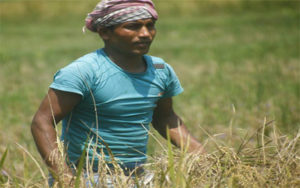God’s Own Country: Kerala, the preferred destination for migrant workers
Better opportunities and peaceful environment are among the factors that make Kerala attractive to migrant workers.

The internal migration of labourers in Kerala has played a pivotal role in the socio- economic development of the state. The migration pattern in Kerala reveals that most of the Keralites migrate to other countries for better job opportunities which in turn have resulted in shortage of workforce in the state. So, to fill that gap, migrants from other states have turned to Kerala for employment. According to a recent report, God’s Own Workforce: Unravelling Labour Migration to Kerala published by the Centre for Migration and Inclusive Development, labour migration in Kerala is a necessity of the state than that of the migrant labourers.
There are many issues pertaining to migration that affects both the migrant and the host economy. Migrants are often discriminated, harassed and unwelcomed in the host state. The host economy in turn faces challenges such as limited job opportunities for the natives, cultural disturbances and economic issues. But when it comes to Kerala, there is a win- win situation for both the migrant worker and the host economy.
“Migrant workers in Kerala have become inevitable. They are doing a wonderful job and their contributions are to be accepted. But there are also some problems involved. The increasing concentration of more migrant workers has radically changed the social scenario. Even otherwise, Kerala is densely populated. The presence of 25 lakhs migrant workers in the state have raised concerns on hygiene, living conditions” and the law and order situation.”
N K Premachandran, Lok Sabha MP
Kerala is considered to be the most preferred destination in the country by the poor internal migrants. There are both push and pull factors responsible for migration in Kerala. The factors that have pushed people to leave their homeland include limited job opportunities, less wages, crop failures, family debts and occurrence of natural disasters and internal conflicts in their home state. Pull factors such as better standard of living, sustained job opportunities, better wages, better provision for healthcare and education, political stability, peaceful social environment and comparatively less discriminatory practices against migrants have attracted migrants to Kerala.
During 2016-2017, migrants from 194 districts of India were found working in Kerala. As per the study conducted by Gulati Institute of Finance and Taxation for the Department of Labour and Skills of the Government of Kerala in 2013, there were about 2.5 million migrant workers in Kerala which rose up to 4 million in 2016. The majority of migrant workforce in Kerala comprises of people from Scheduled Tribes, Scheduled Castes and minority communities from far off regions who feel secure in Kerala as compared to other Indian states.
Not without problems
It has been observed that migrants usually take low- skilled and low- valued jobs in Kerala which demands for strenuous physical labour and put labourers at a high risk of exposure to accidents, injuries and deaths. The migrant workers are consistently exposed to excessive heat, pollutants and poisonous gases that intensify their morbidity and mortality in the long run. The migrant workers are not provided required preventive gears and proper awareness in regards to protective measures to be undertaken when engaged in hazardous activities by their employers who consider such investments as ‘needless’. In few instances, the migrants were charged high for accommodation, not paid fair wages and the cases for confined labour were quite common. Even during demonetization, migrant workers were coerced to accept old currencies by their employers so that they could get rid of their black money. As per the Labour Department Source, around 25 percent migrants soon after demonetization left for their homes. This makes it clear that even in a state like Kerala that is known for welcoming all, the migrant workers have experienced discrimination and exploitation.
Kerala government shows the way
Kerala is among very few Indian states where the government’s response towards migration has been positive. Recently, the government of Kerala launched “Aawaz scheme” for the security of migrant workers. According to this scheme, every migrant worker between 18 to 60 years of age will be provided free medical treatment worth ₹15,000 and an insurance cover of ₹2 lakhs for accident deaths. Awaaz was being implemented to ensure proper data collection for the migrant workers and to provide them healthcare benefits.

The migrant workers rate Kerala as one of the best place when it comes to employment as they receive comparatively better wages and have better living conditions than their home state. The minimum wage in Kerala is ₹600 per day whereas in other states it varies from ₹90- 200. Finance Minister, TM Thomas Issac had proposed to allocate ₹50 crores in the welfare fund for the migrant workers in the Kerala Budget 2018. According to Amnesty International report, the work condition of labourers in India is pathetic. When it comes to government’s objective for faster economic growth, the marginalized communities are often ignored. But, Kerala stands out when it comes to labour friendly policies. N K Premachandran, MP says, “Though the state government is planning measures to ensure their welfare in a structural manner, the floating population of migrant workers makes it difficult to take any concrete measures. Even the statistical data is very difficult to obtain.”
Indeed, migration of labourers had a positive impact on the economy of Kerala but still there are cases where migrants are not wholeheartedly accepted and are exploited. The Government of Kerala had played a crucial role and had adopted proactive measures for the wellbeing of migrant workers which are yet to be substantially rooted at grassroots realities. It is of utmost importance for a state like Kerala which receives a good percentage of migrant workers to have more migrant inclusive development policies and programmes.
